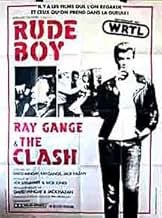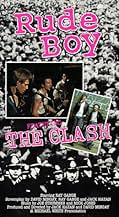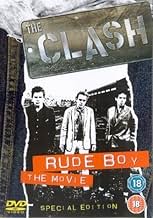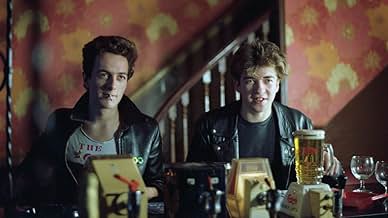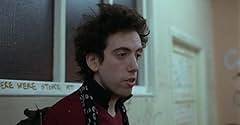IMDb RATING
6.4/10
1.8K
YOUR RATING
A young British punk and roadie for The Clash navigates life in socially torn 1970s England.A young British punk and roadie for The Clash navigates life in socially torn 1970s England.A young British punk and roadie for The Clash navigates life in socially torn 1970s England.
- Awards
- 1 win & 1 nomination total
- Directors
- Writers
- All cast & crew
- Production, box office & more at IMDbPro
Featured reviews
7Koli
It is genuinely difficult to work out where the drama ends and the documentary takes over. When I sat down to watch it I had no idea whether Ray, the fan who becomes a roadie, was an actor or the genuine article. The stilted nature of some of the conversations, and self-conscious grins accompanying them, indicate contrivance, but it's as if real conversations are being reproduced for the camera. Only afterwards did I discover that Ray Gange was acting and had written the script.
The film provides an insight into the world of punk rock in the late seventies. The Clash were more musically adept, and more politically aware, than most punk bands of the era, but the rebellious swaggers and the anger were typical enough. The concert footage is entertaining, and only marred by the fact that much is filmed from the back of the stage. It features much of the band's best material, from White Riot to Tommy Gun to London's Burning.
This is a nostalgic treat for old punk rockers, and a useful introduction for those who, in the late 70s, were too young or allowed punk rock to pass them by.
The film provides an insight into the world of punk rock in the late seventies. The Clash were more musically adept, and more politically aware, than most punk bands of the era, but the rebellious swaggers and the anger were typical enough. The concert footage is entertaining, and only marred by the fact that much is filmed from the back of the stage. It features much of the band's best material, from White Riot to Tommy Gun to London's Burning.
This is a nostalgic treat for old punk rockers, and a useful introduction for those who, in the late 70s, were too young or allowed punk rock to pass them by.
This film is interesting on lots of levels despite also being a bit rubbish!
The historical value is high, an excellent depiction of the time.
The Clash footage is great, the sound is really good.
The character Ray is very believable and a realistic portrayal of the hangers on that bands attract and can't seem to get rid of! Even though the acting ain't great.
So while most of the film's value is historic and sociological in nature, it does hold the attention.
Well done to London Live for finding this one!
Well done to London Live for finding this one!
This intriguing film blurs the line between documentary and reality much in the way 60's classics such as "Medium Cool" do. The story (when it's allowed to tell itself) of the drunken directionless punk is sad, charming and wild. I can see why the Clash disowned the film. It shows how they merely reflect the showbiz side of the struggles of the working class in England. When Ray attempts to tell Mick Jones how much "Stay free" means to him, he is shrugged off with a " I'm watching you." We see Ray being consumed by his own nihilstic rage while the clash use it up to the point of making good pop music with it.
...despite copying the musicians in the studio trope, the porn-shop as symbol of capitalism and the black/white subplot. However "Rude Boy" perhaps deserves a little more attention than it seems to have received.
As a 'proper movie' it's kind of a washout. Aiming for an improvised cinema-verite feel, it's hamstrung by a fatal lack of tension, having apparently been assembled by people with little grasp of editing, narrative or any kind of cinematic style. Despite this, the concert footage of The Clash is indispensable to anyone with an interest in the era, and shows why they were one of the all-time great rock and roll bands. We have very few 70's punk bands recorded properly on film as opposed to video and the difference in quality is striking. Also, Joe Strummer's death is still quite recent as I write and seeing him here in his prime is poignant in the extreme.
In general there are very few film documents of punk. We have Jarman's "Jubilee" which was more of a neo-Elizabethan fantasia, "The Great Rock and Roll Swindle" with its McClarenite rewriting of history and come-lately nonsense like "Breaking Glass". "Rude Boy" at least doesn't fall into any narrative clichés (if only by barely having a plot) and by its very lack of creative flair may succeed best in giving a picture of the time. For example, unlike the myth-making of the likes of "Sid and Nancy", this shows punk gigs as they actually were - largely populated by lads with feather-cuts and tank tops.
By concentrating on hanger-on Gange instead of the band itself, the filmmakers turn the story into one of the relationship between the band and its fan-base - pointed up by having Strummer sing "All The Young Punks" right through in the studio without the backing track to distract us from the lyric.
The commentator who said this did not give a true picture of the politics of the time is surely wrong. I was there and it seems pretty accurate to me. We see the resurgent National Front, the Anti-Nazi League, the bullishness and racism of the police at the time (which would shortly lead to the Brixton riots) and the rise of Thatcherism out of the bankrupt Butskellite consensus. Ray Gange's character in the film seems intended to represent the British white working class at the time - confused, politically disengaged and borderline racist, the attitudes which led to the Thatcher victory we see at the end of the film. The left, variously represented by the SWP (bureaucratic) and Strummer (by turns tokenistic and diffident) fails to capture Gange's imagination and it is the right who seize on the desire for change and turn it to their own advantage.
Rude Boy is a strange curate's egg, then. There may have been a really good film struggling to get out of this morass, but we'll never know. The special edition DVD has a "Just Play the Clash" function which lets you view only the concert footage and I suspect this will get a lot of use.
Rating? 3/10 for the story, 10/10 for the music.
As a 'proper movie' it's kind of a washout. Aiming for an improvised cinema-verite feel, it's hamstrung by a fatal lack of tension, having apparently been assembled by people with little grasp of editing, narrative or any kind of cinematic style. Despite this, the concert footage of The Clash is indispensable to anyone with an interest in the era, and shows why they were one of the all-time great rock and roll bands. We have very few 70's punk bands recorded properly on film as opposed to video and the difference in quality is striking. Also, Joe Strummer's death is still quite recent as I write and seeing him here in his prime is poignant in the extreme.
In general there are very few film documents of punk. We have Jarman's "Jubilee" which was more of a neo-Elizabethan fantasia, "The Great Rock and Roll Swindle" with its McClarenite rewriting of history and come-lately nonsense like "Breaking Glass". "Rude Boy" at least doesn't fall into any narrative clichés (if only by barely having a plot) and by its very lack of creative flair may succeed best in giving a picture of the time. For example, unlike the myth-making of the likes of "Sid and Nancy", this shows punk gigs as they actually were - largely populated by lads with feather-cuts and tank tops.
By concentrating on hanger-on Gange instead of the band itself, the filmmakers turn the story into one of the relationship between the band and its fan-base - pointed up by having Strummer sing "All The Young Punks" right through in the studio without the backing track to distract us from the lyric.
The commentator who said this did not give a true picture of the politics of the time is surely wrong. I was there and it seems pretty accurate to me. We see the resurgent National Front, the Anti-Nazi League, the bullishness and racism of the police at the time (which would shortly lead to the Brixton riots) and the rise of Thatcherism out of the bankrupt Butskellite consensus. Ray Gange's character in the film seems intended to represent the British white working class at the time - confused, politically disengaged and borderline racist, the attitudes which led to the Thatcher victory we see at the end of the film. The left, variously represented by the SWP (bureaucratic) and Strummer (by turns tokenistic and diffident) fails to capture Gange's imagination and it is the right who seize on the desire for change and turn it to their own advantage.
Rude Boy is a strange curate's egg, then. There may have been a really good film struggling to get out of this morass, but we'll never know. The special edition DVD has a "Just Play the Clash" function which lets you view only the concert footage and I suspect this will get a lot of use.
Rating? 3/10 for the story, 10/10 for the music.
The Clash's Rude Boy is a misguided, exciting and overall decent attempt at capturing the band the Clash at the height of their crossover from punk pioneers (if there could legitimately be called such a thing) to full-blown rock stars in the UK. The story itself surrounding them is perhaps less great than the band itself, which might be expected considering all that can be done in integrating one character into a band through a fictional script. The movie examines an angry youth (Gange) who works in a sex shop, until he meets up with The Clash and becomes their roadie. The story of Gange (and his view of the situation in Britain at the time it was made, with the occasional communist remark or two depending on the perspective of the viewer) is a little confusing and muddled at times.
Yet when the Clash take the stage, which is fairly often, the film is thriving and alive as any concert film in the history of rock movies. Maybe it may appeal more to punk fans from the 70's than the punk fans- or what bunch of posers that try and act hip from their Hot Topic gear- but it's hard not to pass it up as even a casual fan either. Performances include: I'm so Bored with the USA, White Riot, Janie Jones, White man in Hammersmith, and Police and Thieves, among others.
Yet when the Clash take the stage, which is fairly often, the film is thriving and alive as any concert film in the history of rock movies. Maybe it may appeal more to punk fans from the 70's than the punk fans- or what bunch of posers that try and act hip from their Hot Topic gear- but it's hard not to pass it up as even a casual fan either. Performances include: I'm so Bored with the USA, White Riot, Janie Jones, White man in Hammersmith, and Police and Thieves, among others.
Did you know
- TriviaAs an intro Before playing 'White Riot' as bouncers & the audience were fighting at the Glasgow Apollo Joe Strummer says "Simmer down ..Control your temper" . This is the first line from Bob Marley & the Wailers 1963 Jamaican hit single 'Simmer Down'
- GoofsWhen reporting the outcome of the trial, David Mellor is described as "David Mellor QC". Mellor was not made a Queen's Counsel until 1987.
- Quotes
Lead guitarist: You know what I think, don't you? I've been watching you.
Rude Boy: Yeah, I noticed. Quite a lot.
Lead guitarist: I been watching you.
Rude Boy: I'll keep it in mind.
Lead guitarist: Do.
- Alternate versionsReleased at 133 minutes in Europe; US prints run 120 minutes.
- ConnectionsFeatured in White Riot (2019)
- SoundtracksPolice And Thieves
Written by Junior Murvin and Lee 'Scratch' Perry
Sung by Junior Murvin
Island Records
- How long is Rude Boy?Powered by Alexa
Details
- Release date
- Country of origin
- Language
- Also known as
- The Clash: Rude Boy
- Filming locations
- Camberwell Road, Southwark, London, England, UK(procession of Royal cars passes along)
- Production companies
- See more company credits at IMDbPro
Contribute to this page
Suggest an edit or add missing content

